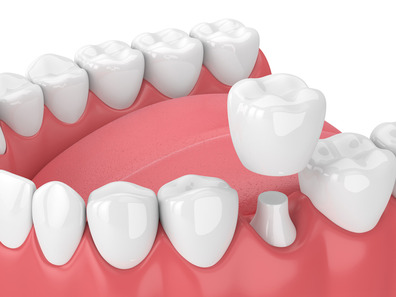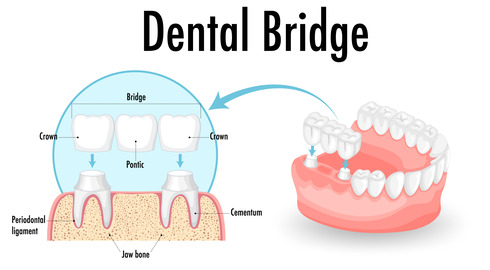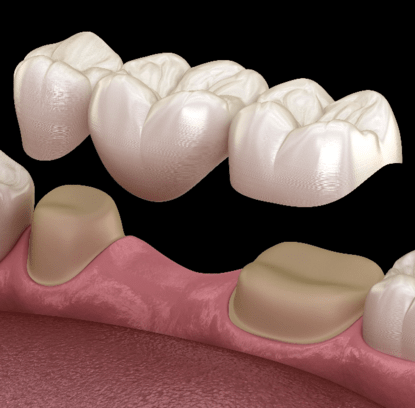Bridges & Crowns
Dental Crowns & Dental Bridges: Restoring Your Smile
When it comes to dental restoration, there are two versatile options that can help you regain a beautiful smile and maintain your oral health: dental crowns and dental bridges. These solutions address different dental issues and offer unique advantages. In this article, we’ll explore the differences between dental crowns and dental bridges, along with the pros of each.
Dental Crowns
What Are Dental Crowns?
Dental crowns, also known as caps, are custom-made tooth-shaped covers that encase a damaged or weakened tooth. They are crafted from various materials, including porcelain, ceramic, metal alloys, or a combination of these, to ensure a natural look and a durable structure.

The Benefits of Dental Crowns:
- Restoration of Tooth Functionality: Dental crowns provide strength and stability to a weakened tooth, allowing it to function normally and withstand the pressures of chewing.
- Aesthetic Enhancement: Crowns are designed to match the color and shape of your natural teeth, ensuring a seamless and attractive appearance.
- Protection from Further Damage: Crowns act as a protective barrier, preventing further damage to the tooth and reducing the risk of infection.
- Longevity: With proper care, dental crowns can last for many years, making them a cost-effective investment.
Dental Bridges
What are Dental Bridges?
Dental bridges are prosthetic devices used to replace one or more missing teeth. They consist of one or more artificial teeth (pontics) anchored to adjacent healthy teeth or dental implants.

The Benefits of Dental Bridges:
- Tooth Replacement: Bridges fill gaps caused by missing teeth, restoring your ability to chew and speak properly.
- Stability: By anchoring to neighboring teeth or implants, bridges are securely held in place, ensuring stability and preventing shifting.
- Aesthetic Improvement: Bridges are designed to match the appearance of your natural teeth, enhancing your smile’s aesthetics.
- Prevention of Dental Issues: Filling the gap left by missing teeth helps maintain proper alignment and bite, reducing the risk of oral health problems.
What are the Differences Between Crowns and Bridges
Functionality
Crowns restore the functionality of a single tooth, while bridges restore the functionality of multiple missing teeth.
Placement
Crowns are fixed directly onto a single tooth, whereas bridges require support from adjacent teeth or implants.
Dental Crowns & Bridges vs. Dental Implants
Dental crowns and bridges can be considered an alternative to dental implants, however, each method has its merits and drawbacks.
There are some significant differences between the two but all of the methods use an artificial tooth in place of the natural tooth.
Where dental crowns and bridges use the original tooth (or teeth in the case of a bridge) as the point of attachment, the dental implant involves the process of implanting an attachment point for the artificial tooth in the jaw bone.
Learn about our dental implants at Alpine Dental Clinic.
Pros of Dental Crowns & Bridges
Preservation of Natural Tooth: Crowns allow you to retain your natural tooth, which can be beneficial for maintaining oral health and preventing adjacent teeth from shifting.
Aesthetic Restoration: Crowns are designed to match the color, shape, and size of your natural teeth, ensuring a seamless and natural appearance.
Quick Procedure: Getting a dental crown is often a faster process compared to dental implants, with minimal recovery time.
Cost-Effective: Crowns are generally more cost-effective than dental implants, making them a budget-friendly choice for tooth restoration.
Pros of Dental Implants
Permanent Solution: Implants are a long-term and often permanent solution for tooth replacement. With proper care, they can last a lifetime.
Standalone Restoration: Implants do not rely on neighboring teeth for support, preserving the integrity of surrounding teeth.
Excellent Stability: Implants provide excellent stability and function, mimicking the strength and feel of natural teeth.
Preservation of Jawbone: Implants stimulate the jawbone, preventing bone loss that typically occurs when teeth are missing.
Cons of Dental Crowns & Bridges
Requires Sufficient Tooth Structure: Crowns require that the underlying tooth has enough healthy structure to support the crown.
Limited Lifespan: While durable, crowns may need replacement after a number of years, typically between 10 to 15 years, depending on care and material.
Cons of Dental Implants
Surgical Procedure: Implant placement involves surgery and a longer recovery period compared to getting a dental crown.
Higher Cost: Dental implants are generally more expensive than dental crowns due to the surgical procedure and materials involved.
Treatment Time: The entire implant process, from placement to crown attachment, can take several months.
In summary, dental crowns and dental bridges are versatile solutions that can significantly improve your oral health and smile. Crowns are ideal for strengthening and enhancing individual teeth, while bridges are perfect for replacing missing teeth and restoring proper oral function.

Crowns & Bridges by Alpine Dental Clinic
For the restoration of your smile and function of you teeth, trust Alpine Dental in Swift Current. Our highly experienced staff will ensure you have the best experience, result and aftercare possible.
Contact us today for your initial consultation and regain your oral function.



 Monday – Friday 8AM – 4PM
Monday – Friday 8AM – 4PM
